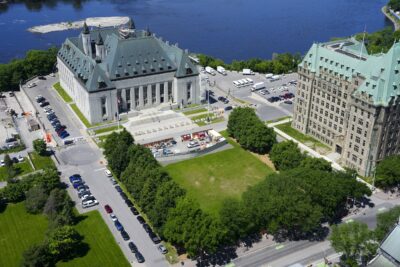Ottawa urges Supreme Court to set limits on how provinces can override Charter
By Canadian Press on September 17, 2025.

MONTREAL — The federal government is asking the Supreme Court of Canada to set limits around how provincial governments can override the Charter of Rights and Freedoms.
Ottawa brought forward the request in a factum filed at the court on Wednesday, as part of the landmark case on Quebec’s secularism law, known as Bill 21.
Quebec has invoked the notwithstanding clause of the Charter in its legislation.
The clause can be used by provinces to shield legislation from constitutional challenges, but in it’s filing, the federal government urged the court to set limits on how the notwithstanding clause could be invoked.
It argued repeated use of the clause amounts to “indirectly amending the Constitution,” and that the court should be able to rule on whether it can result in the “irreparable impairment” of Canadians’ rights.
“The prolonged impossibility of exercising a right or freedom would, in practice, be tantamount to denying its very existence,” the lawyers warned in the factum submitted Wednesday to the court.
Ontario and Alberta have supported the use of the notwithstanding clause, saying it is an essential part of the Canadian Constitution and should not be undermined by the country’s top court.
In arguments filed Wednesday as part of the landmark Supreme Court of Canada case, the two provinces defended Quebec’s pre-emptive use of the notwithstanding clause when it passed its 2019 secularism law.
The law prohibits public sector workers in positions of authority, including teachers and judges, from wearing religious symbols on the job.
Ontario “does not support Quebec’s decision to require citizens to remove religious symbols to serve the public or to receive public services,” the province’s attorney general wrote in a 34-page factum. “But that is a decision for the national assembly, and ultimately the voters of Quebec, to make for themselves.”
Both provinces say the notwithstanding clause, Section 33 of the Canadian Charter of Rights and Freedoms, was fundamental to the negotiation of the 1982 Constitution and preserves the sovereignty of provincial legislatures. The clause allows governments to override some Charter rights and shield legislation from constitutional challenges.
“Section 33 was… a hard-fought and hard-won compromise,” Alberta’s factum reads. “Simply put, there would have been no Charter without (it).”
The Supreme Court has agreed to hear a legal challenge of Bill 21 brought by several groups that oppose the law, though a date for a hearing has not been set. Some of the appellants are asking the court to restrict the pre-emptive use of the notwithstanding clause, or to find that courts can still weigh in on the constitutionality of a law that is allowed to stand when the clause is invoked.
Ontario, however, argues that these requests amount to “attempts to amend the Constitution by the back door.” The province says a prohibition on the pre-emptive use of the notwithstanding clause would mean that legislation “would have to sit in limbo – potentially for years – between the time it is struck down… and the passage of new legislation which invokes section 33.”
Alberta argues that a court issuing a non-binding declaration on a law passed using the notwithstanding clause “would effectively become an interest group vying for the attention of voters in a political forum.”
There are dozens of interveners in the Supreme Court case, including several provinces.
Since Bill 21 was passed, other provinces have made more frequent use of Section 33. In 2023, the Saskatchewan government invoked the clause to pass a law requiring parental consent for students under 16 to use their preferred name or pronouns at school. Quebec has also invoked Section 33 to pass other legislation, including an overhaul of the province’s language law.
Last month, the Saskatchewan Court of Appeal ruled that courts can issue declarations on rights violations in legislation that invokes the notwithstanding clause. Quebec opposed such declarations in its arguments filed to the Supreme Court in August.
Prime Minister Mark Carney has said he opposes the pre-emptive use of Section 33.
On Wednesday, Bloc Québécois Leader Yves-François Blanchet accused Carney of using the notwithstanding clause as a pretext to attack Quebec’s approach to secularism.
“If you want to attack the fundamental values of Quebec and the national language of Quebec, say so and do it openly,” he said.
This report by The Canadian Press was first published Sept. 17, 2025.
Maura Forrest and Miriam Lafontaine, The Canadian Press
26-25





The Charter of Rights and Freedoms is a joke anyway and multiple times has been bent to sway in the favour of governments and lawyers.
One example: it says ALL are to be treated EQUAL under the law! What a joke! If you are a millionaire, get charged for a serious crime like murder, you can hire a team of private investigators, expert witnesses, and the best law firm as a defense, while the average person may be able to just get legal aide or some low budget lawyer.
The Charter of Rights and Freedoms needs to be abolished or amended, because right now it is a failure!